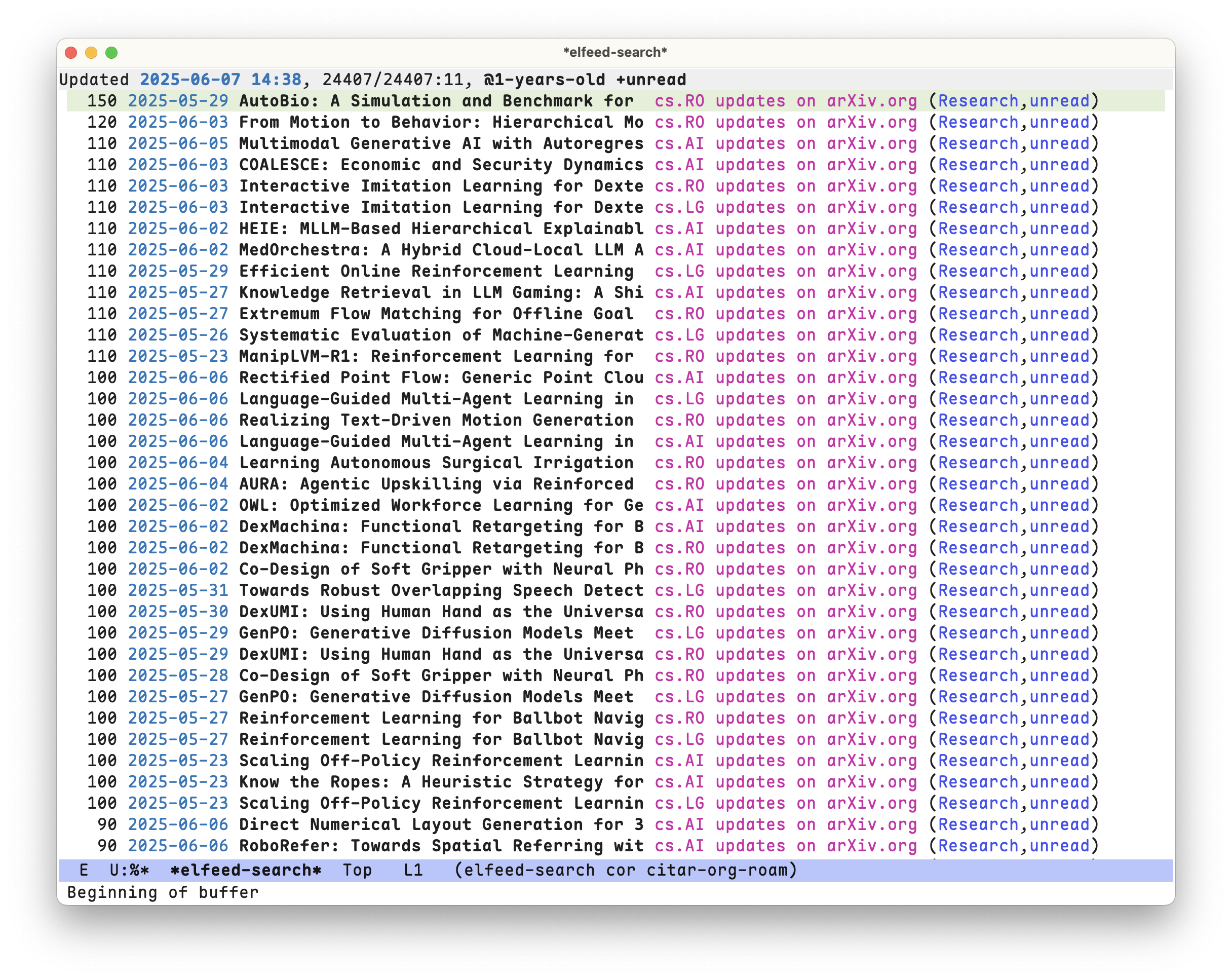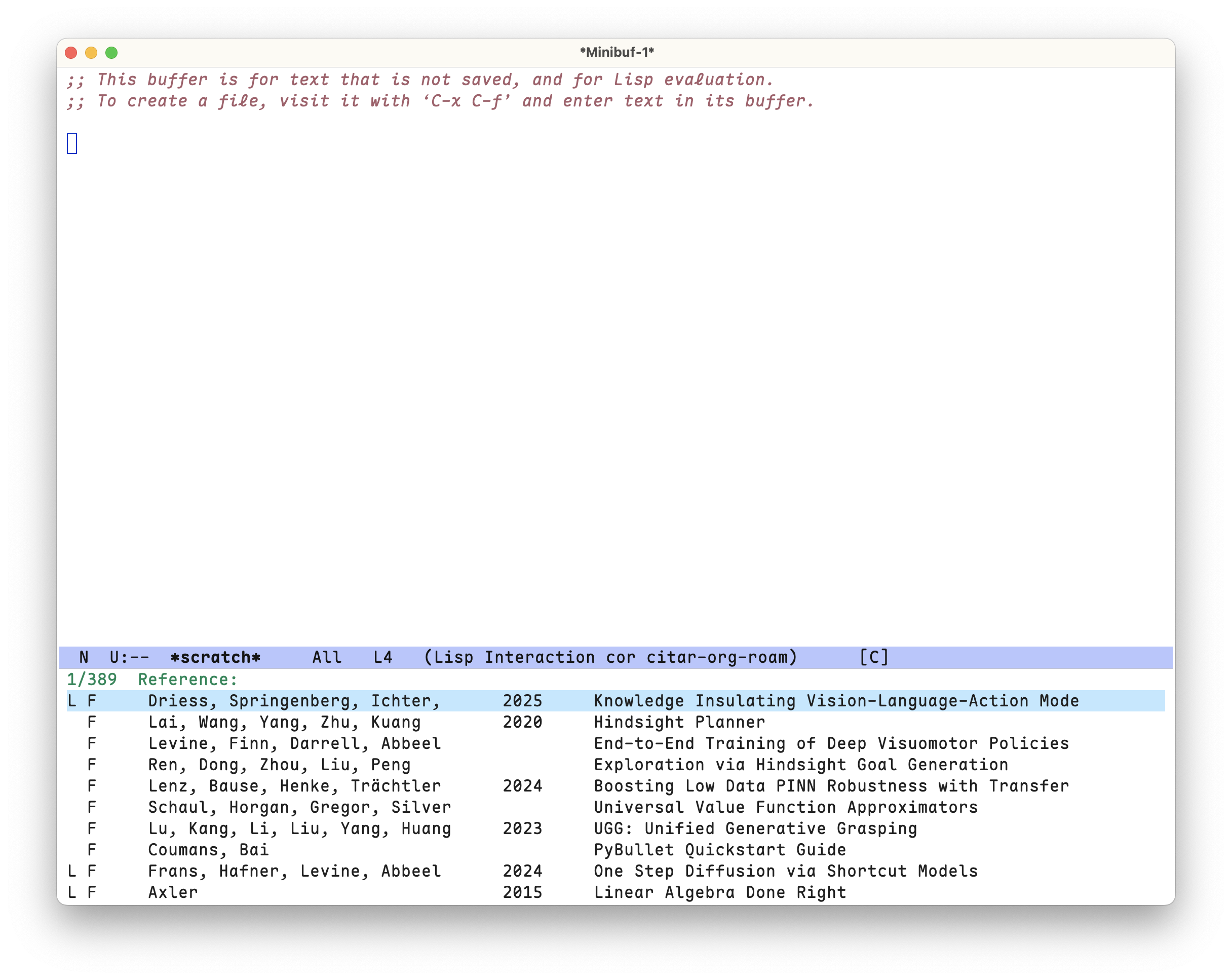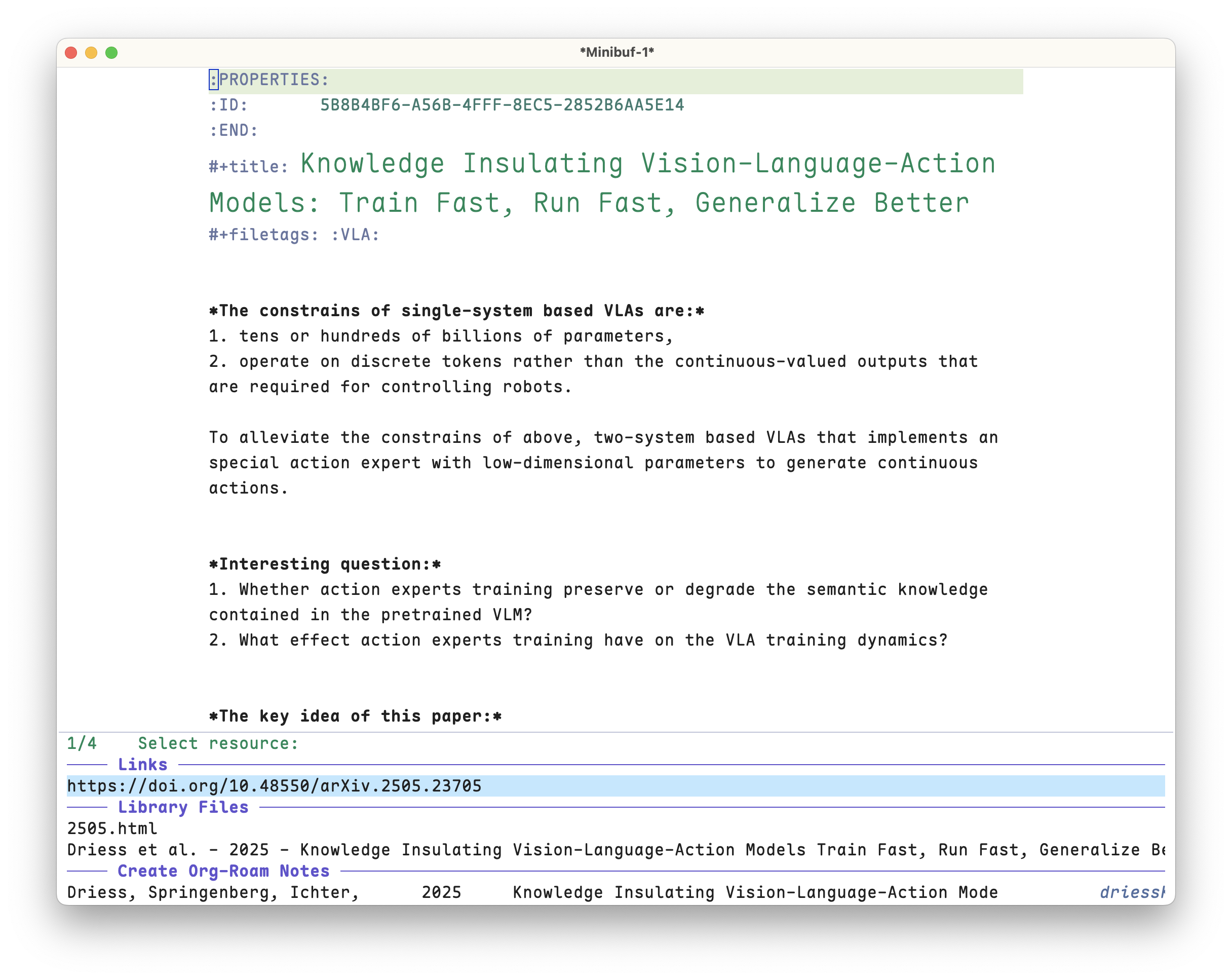Keeping on top of the daily flood of arXiv papers is hard enough; turning what you read into something you can retrieve later is even harder. This post walks through my end‑to‑end solution that
- discovers relevant papers automatically,
- stores & annotates them with Zotero,
- links every paper to an Org‑roam note via citar inside Emacs,
- generates a browsable graph (Org‑roam‑UI) and a Hugo‑compatible Markdown version of each note, and
- publishes both to GitHub Pages with zero manual steps.
Bird’s-Eye View of the Stack
FreshRSS → Elfeed (+ Score) → Zotero (+ Better‑BibTeX) → Org‑roam (+ citar) → GitHub Actions → Org-roam-UI & Quartz
| Stage | Purpose |
|---|---|
| FreshRSS | Self‑hosted RSS aggregator that normalises arXiv feeds |
| Elfeed | Pull feeds into Emacs; elfeed‑score ranks them |
| Zotero | Reference manager & PDF annotator |
| Better-BibTeX | Keeps a single live library.bib file in sync |
| Citar | Bridges Zotero ↔ Org‑roam via org-cite |
| Org-roam | Zettelkasten / knowledge graph within Emacs |
| GitHub Actions | Build static graph (Org-roam-UI) + Quartz web site |
From RSS to Ranked Paper List
FreshRSS – My Personal Feed Backend
I run FreshRSS on a tiny VPS. The important bits are:
- Fever API support → lets Elfeed treat FreshRSS as if it were a Fever client.
- Tagging inside FreshRSS → those tags come through to Elfeed.
Elfeed – Reading & Scoring Feeds inside Emacs
The snippet below loads Elfeed plus two add‑ons:
elfeed‑protocolfor Fever API access.elfeed‑scorefor keyword‑based ranking.
(straight-use-package 'elfeed)
(straight-use-package 'elfeed-protocol)
(straight-use-package 'elfeed-score)
(use-package elfeed
:config
(setq-default elfeed-search-filter "@1-years-old +unread")
(defun elfeed-mark-all-as-read ()
(interactive)
(mark-whole-buffer)
(elfeed-search-untag-all-unread)))
(use-package elfeed-protocol
:config
(setq elfeed-use-curl t)
(elfeed-set-timeout 36000)
(setq elfeed-curl-extra-arguments '("--insecure"))
(setq elfeed-protocol-fever-fetch-category-as-tag t)
(defun hiro/get-fever-pwd ()
(replace-regexp-in-string "[[:space:]\n]+"
""
(with-temp-buffer
(insert-file-contents "~/Documents/keys/fever/pwd.txt")
(buffer-string))))
(setq elfeed-protocol-feeds `(("fever+https://fy@freshrss.nicehiro.org"
:api-url "https://freshrss.nicehiro.org/api/fever.php"
:password ,(hiro/get-fever-pwd))))
(setq elfeed-protocol-enabled-protocols '(fever))
(elfeed-protocol-enable))
(use-package elfeed-score
:config
(elfeed-score-enable)
(define-key elfeed-search-mode-map "=" elfeed-score-map)
(elfeed-score-serde-load-score-file "~/.config/emacs/elfeed.score")
(setq elfeed-search-print-entry-function #'elfeed-score-print-entry))
Collecting & Annotating PDFs with Zotero
Zotero’s job is heavy-lifting storage: full-text PDFs, annotations on iPad, quick tags, and sharing libraries with collaborators. The magic glue is Better-BibTeX (BBT), which:
- auto‑exports every item to
~/Documents/roam/library.bib - assigns human‑readable citekeys (e.g.
brohan2023rt2)
Because BBT writes directly to disk, Emacs always sees an up‑to‑date BibTeX file.
Making Notes in Emacs
citar – Org-cite Backend + Zotero Bridge
citar turns every BibTeX entry into a first‑class Emacs object. Press C‑c b inside Org and you get a Helm/Vertico‑powered picker. The following configuration:
- sets citar as the insert/follow/activate processor for
org‑cite - teaches citar where the bibliography lives
- adds citar-org-roam so that ‘create-note’ drops you straight into an Org-roam buffer whose filename matches the citekey.
;; Ensure :zotero: links are redirected to org-mode
(use-package org
:custom
(org-link-set-parameters "zotero" :follow
(lambda (zpath)
(browse-url
(format "zotero:%s" zpath)))))
(use-package oc
:custom
(setq org-cite-global-bibliography '("~/Documents/roam/library.bib")))
;; Use `citar' with `org-cite'
(straight-use-package 'citar)
(use-package citar
:after oc
:custom
(org-cite-insert-processor 'citar)
(org-cite-follow-processor 'citar)
(org-cite-activate-processor 'citar)
(citar-bibliography '("~/Documents/roam/library.bib"))
(citar-org-roam-note-title-template "${title}")
(add-to-list 'citar-file-open-functions '("pdf" . citar-file-open-external))
:bind
(:map org-mode-map :package org ("C-c b" . #'org-cite-insert)))
(straight-use-package 'citar-org-roam)
(use-package citar-org-roam
:after (citar org-roam)
:config (citar-org-roam-mode))
Org-roam – The Knowledge Graph
Below we:
- point Org‑roam at
~/Documents/roam/ - use autosync so the graph DB stays current
- define two capture templates: a generic one and a literature note that pre‑populates metadata from citar.
(straight-use-package 'org-roam)
(use-package org-roam
:diminish
:bind (("C-c n a" . org-id-get-create)
("C-c n l" . org-roam-buffer-toggle)
("C-c n f" . org-roam-node-find)
("C-c n g" . org-roam-graph)
("C-c n i" . org-roam-node-insert)
("C-c n c" . org-roam-capture)
("C-c n j" . org-roam-dailies-capture-today)
("C-c n r" . org-roam-ref-find)
("C-c n R" . org-roam-ref-add)
("C-c n s" . org-roam-db-sync))
:custom
;; (org-roam-database-connector 'sqlite-builtin)
(org-roam-directory (expand-file-name "~/Documents/roam/"))
(org-roam-dailies-directory (expand-file-name "~/Documents/roam/journal"))
(org-roam-db-location "~/Documents/roam/roam.db")
(org-roam-db-gc-threshold most-positive-fixnum)
(with-eval-after-load "org-roam"
(org-roam-setup)
(org-roam-db-autosync-mode)))
(straight-use-package 'consult-org-roam)
(use-package consult-org-roam
:after org-roam consult
:init
(require 'consult-org-roam)
;; Activate the minor mode
(consult-org-roam-mode 1)
:custom
;; Use `ripgrep' for searching with `consult-org-roam-search'
(consult-org-roam-grep-func #'consult-ripgrep)
;; Configure a custom narrow key for `consult-buffer'
(consult-org-roam-buffer-narrow-key ?r)
;; Display org-roam buffers right after non-org-roam buffers
;; in consult-buffer (and not down at the bottom)
(consult-org-roam-buffer-after-buffers t)
:config
;; Eventually suppress previewing for certain functions
(consult-customize
consult-org-roam-forward-links
:preview-key (kbd "M-."))
:bind
;; Define some convenient keybindings as an addition
("C-c n e" . consult-org-roam-file-find)
("C-c n b" . consult-org-roam-backlinks)
("C-c n l" . consult-org-roam-forward-links)
("C-c n r" . consult-org-roam-search))
;; Capture templates
(use-package org-roam
:config
(setq org-roam-capture-templates
'(("d" "default" plain
"%?"
:target
(file+head
"%<%Y%m%d%H%M%S>-${slug}.org"
"#+title: ${note-title}\n")
:unnarrowed t)
("n" "literature note" plain
"%?"
:target
(file+head
"%(expand-file-name (or citar-org-roam-subdir \"\") org-roam-directory)/${citar-citekey}.org"
"#+title: ${citar-citekey} (${citar-date}). ${note-title}.\n#+created: %U\n#+last_modified: %U\n\n")
:unnarrowed t))))
Publishing Automatically
Static Graph via Org-roam-UI
The GitHub Action below takes the roam.db file committed to the repo, renders the interactive graph, and pushes it to GitHub Pages.
name: Generate static org-roam-ui page
permissions:
contents: read
pages: write
id-token: write
on:
push:
branches:
- master
jobs:
main:
runs-on: ubuntu-latest
steps:
- name: Generate org-roam-ui page
uses: ikoamu/publish-org-roam-ui@main
with:
org-roam-db-filename: roam.db
deploy-to-pages: trueYou can check here to preview the Org-roam-UI website.
Quartz Site via ox-hugo
- ox‑hugo converts each Org note to GitHub‑friendly Markdown.
- A simple after‑save hook calls my wrapper
hiro/org-publish-to-quartzso I never forget to export.
(straight-use-package 'ox-hugo)
(use-package ox-hugo
:after ox
:config
(setq org-hugo-export-attachment t))
(defun hiro/org-publish-to-quartz ()
"Export current org‑roam buffer to Quartz‑compatible markdown."
(interactive)
(let ((org-hugo-auto-export-on-save t))
(org-hugo-export-to-md)))
(add-hook 'org-mode-hook
(lambda () (add-hook 'after-save-hook #'hiro/org-publish-to-quartz 0 t)))I also write a function to export a directory of org-roam notes to markdown notes.
(defun my/hugo-export-org-directory (org-dir &optional recursive)
"Export every *.org file in ORG-DIR to Markdown with ox‑hugo.
With a prefix argument (C-u) the search is RECURSIVE, so it walks
into sub‑directories as well.
Each file is exported with `org-hugo-export-to-md' (whole‑file
workflow). You still control the output location and front‑matter
via #+hugo_* keywords or your usual ox‑hugo variables."
(interactive (list (read-directory-name "Org notes directory: ")
current-prefix-arg))
(let* ((files (if recursive
(directory-files-recursively org-dir "\\.org\\'")
(directory-files org-dir t "\\.org\\'")))
(org-hugo-export-front-matter-format "yaml")
;; don’t pop up a temporary *Org Export* buffer for every file
(org-export-show-temporary-export-buffer nil))
(message "ox‑hugo: exporting %d file%s …"
(length files) (if (= (length files) 1) "" "s"))
(dolist (f files)
(with-current-buffer (find-file-noselect f)
(message " → %s" (file-name-nondirectory f))
;; nil nil nil nil = (async subtreep visible-only body-only)
(org-hugo-export-to-md) ; whole‑file export
(save-buffer) ; keep any :EXPORT_ props you added
(kill-buffer)))
(message "ox‑hugo: done – %d file%s exported."
(length files) (if (= (length files) 1) "" "s"))))
;; Optional convenience alias:
;; M-x hugo-export-this-directory (recursive with C-u)
(defalias 'hugo-export-this-directory #'my/hugo-export-org-directory)Quartz Tips & Gotchas
- Set
org-hugo-default-section-directoryto/. Otherwise Quartz will nest every note underposts/. - Update
quartz.config.tsso its FrontMatter parser looks fortitle,date,tags, etc.
You can check here to preview the Quartz website.
And that’s the whole pipeline—fully reproducible, mostly automated, and entirely powered by open‑source tools.